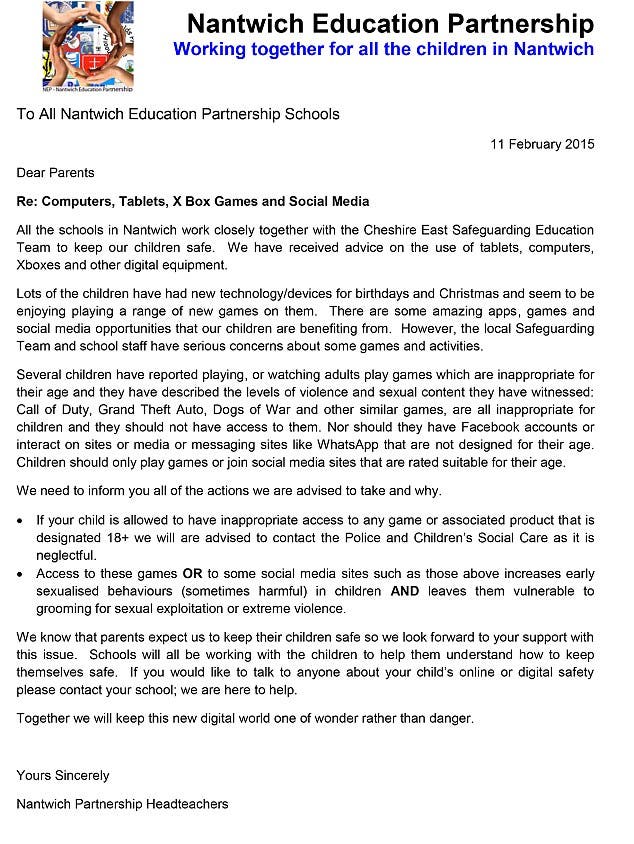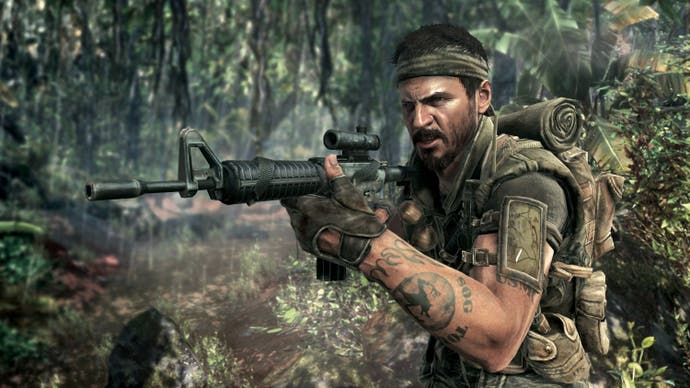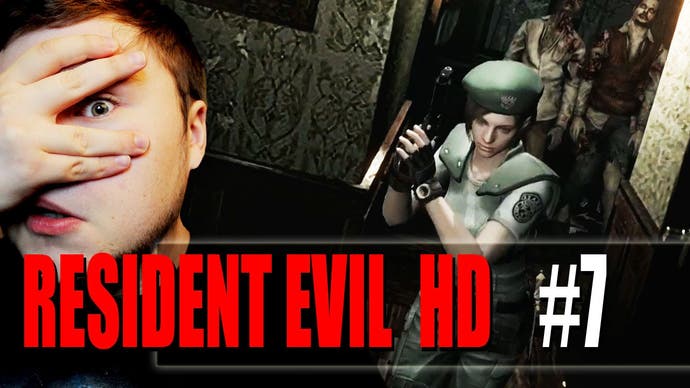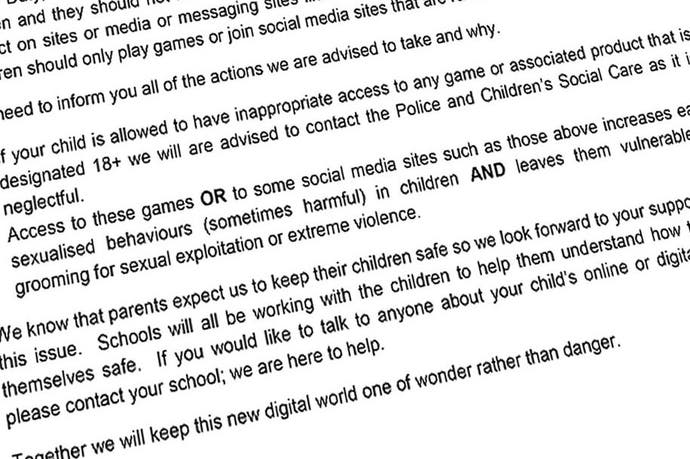"He suddenly became incredibly sullen, angry and frustrated. He was 10"
Teachers versus parents who let their kids play adult games: the other side of the story.
Earlier this week we covered a headteachers group who threatened to report parents who let their children play 18-rated games to the police and social services for neglect.
Nantwich Education Partnership, a group of 14 primary and two secondary schools in Cheshire, wrote to parents last month after finding some children had been playing the likes of Grand Theft Auto, Gears of War and Call of Duty.
"If your child is allowed to have inappropriate access to any game or associated product that is designated 18+, we are advised to contact the police and children's social care as this is deemed neglectful," the letter, published below, reads.
Mary Hennessy Jones, the headteacher who drafted the letter, said the drastic measure was a bid to help parents keep their children as safe as possible "in this digital era".
"It is so easy for children to end up in the wrong place and parents find it helpful to have very clear guidelines," she said.
But many in the gaming community reacted to the news with disbelief. Some called on the headteachers to speak with parents before considering any report to social services. Others questioned the teachers' right to issue the threat in the first place. In short, most of us agreed: threatening to report parents because their children were found to be playing 18-rated games was at best unproductive, at worst a dangerous step.
Amid the debate, one side of the story was lost: the teachers'. Following the publication of our report, we interviewed one teacher currently working at a school in the Crewe and Nantwich area to get his side of the story.
The teacher, who wishes to remain anonymous, plays and loves games. He's put hundreds of hours into Half-Life and World of Warcraft, for example, and reads Eurogamer - and the comments - every day. Although he doesn't currently work in any of the Nantwich Education Partnership schools, he has taught at some of them in the past and, he tells us, sympathises with the headteachers who sent the controversial letter to parents.
The teacher's message to the gaming community is presented below. In it he reveals the effect children playing adult-focused games can have, the challenge teachers face getting parents to understand the damage this can cause, and issues a call to arms to gamers everywhere: let's educate.

The letter was more of a blunt tool to get a message across. Communicating on games is very difficult. Parents are ignorant or apathetic about what games actually are. I know my school has had cyber safety talks where we've invited parents to come in and talk to them about social media and games. Uptake would be minimal; a handful, single digit figures of parents who come in to learn about it. They'll be busy people and not want to talk about it, but getting the message across has proved difficult for teachers. We're seeing the impact in the classrooms. Even talking one-on-one with parents, some will take it on board and act accordingly, but some won't.
So the letter was just a way of saying, 'look, this is an issue.' It is something schools would be obliged to report. It's part of a bigger picture of general neglect. I don't think it would just be, 'if a child had been heard to be playing Call of Duty,' that would be reported. This is one of many things.
My partner teaches in a different school than mine, but also in the Crewe and Nantwich area, which is from a very deprived background. Children come in not being fed, not washed and crawling with lice. Often, the only parenting they get is they'll be given a tablet or a console and just left alone with it. If it was ever reported to the police or social services, it would be, 'this child has this list of problems as well as exposure to damaging games.'
It's a very real impact. I've personally not seen children acting more violently because of games. The impact is more them being frightened of things they've seen or things they've played. Five Nights at Freddy's was very popular in our school for a while. Five Nights at Freddy's doesn't sound particularly frightening. It's on the App Store. It's one that could fly under the radar of a lot of parents.
I had two children in particular who'd been nodding off at their desks. When you speak to them separately they all say, 'oh I couldn't sleep because I was scared of this game' they'd either been playing, or their friends had coerced them into playing. I think that's a problem.
There are some who will just play games rather than anything else. I remember when I was a kid, my parents would worry about how many games I would play. When it's tied together with a lack of attention at home or disruptions at home, and their only form of entertainment is violent games, it can be a problem.
My children in my class are eight. Some of them are nine. Lots of them would get messages over Xbox Live, voice messages, written messages, that can be very unkind, or inviting them to come play 18-rated games, which they can't play, and then mocking them because they're not allowed or they're too scared to play them. It's another channel of communication a lot of parents are ignorant of. That was mentioned in the letter. Things like Facebook, WhatsApp and Xbox Live are methods of communicating that parents are maybe not aware of.
One parent told me how proud she was that her eight-year-old son could play Call of Duty because it was an 18. I said, 'oh, that's an 18-rated game.' And she said, 'oh yeah, but he's very good. He can play it really well.' I pointed out, 'oh, well it's 18 more for the content rather than the difficulty.' She sort of um-ed and ah-ed and said, 'oh, he's very mature for his age. I think he can deal with it.'
There is a perception among a lot of parents that the age rating reflects difficulty. It's a terminology issue. Games in a broader sense have always been a bit hamstrung by the term 'games'. The nature of the name 'games' suggests a playful thing, not necessarily something with a narrative, or something that could potentially be upsetting or violent. That's a problem with parents as well.
I think the game industry does an awful lot with PEGI ratings and console age restrictions. The letter didn't point the finger at the games themselves or the game industry. The letter mentioned how lots of games can be constructive and positive influences in a child's life.
I don't think teachers at large or the writers of the letter have a problem with the game industry. It is parents. And I think lots of the people in the comments saw it as an attack on the game industry. Or they saw it as an attack on gaming culture, which it wasn't. It was a letter to parents who may be naive about how brilliant games can be, but also how there needs to be a considered approach to children playing games. This letter was an effort at influencing parents and making parents more aware of their responsibilities. I don't think the letter for a moment was an attack against games or against the industry, although I think a lot of Eurogamer commenters perceived it that way.

The teachers who wrote that letter don't want to be making threats. But this isn't the first attempt at communication. This letter is more of a last resort. This is the first gaming culture has seen of an interaction between teachers and parents. Some people seem to think this is the first thing teachers have done, that their monocles have fallen out into their cups of tea and they've gone, 'goodness me, this is horrific, we must write a letter.'
At my school we've invited parents in to talk about safety online and video games. Increasingly, younger teachers like me grew up with games. I've had chats with parents about games. This letter, this threat, it is a bit clumsy, but teachers have tried. I've seen in our newsletter, 'it's coming to our attention that lots of children are playing games that are perhaps inappropriate for them. Please be sure to check any games your child plays are appropriate.' Teachers have tried that. This dialogue has been attempted and had limited success. The teachers haven't started with threats. This is a last ditch, albeit clumsy attempt to try and change things, because it is having a detrimental effect on some children.
Teachers have it hard. We are seen by some media as killjoys, or that we don't know what we're talking about. I cringed when I read the letter. It said, 'lots of children had been playing games such as Call of Duty and Dogs of War,' which was meant to be Gears of War. I can see how gamers would look at that and say, 'these guys don't know what they're talking about.' Yes, the headteachers might not know about the content of the games, but we see the effect day to day.
We've made lots of attempts to reach out to parents to try and educate them. Yes, the game industry has done lots, but I'd hope your readers would understand, it is a problem, not because of the violence but because of the children being scared, or it's used as a surrogate parent at home. The problem is when children are left with nothing but games. I've never heard a teacher say, 'so and so has punched so and so because they've been playing Call of Duty.' The problem is more children being frightened by things they see and it having an effect on their well-being.
Every now and then in the news there will be a case of a neglected child who's died. It will be, well why didn't the teachers do anything? Who didn't see this? Yes, of course there will be mistakes made, and some blame will lie with teachers for not noticing these things. But teachers are being held more and more accountable. And if there's a child under our care who something awful happens to, and it's revealed we knew they were playing games they shouldn't be playing, it could well come back on us.

I taught a child two years ago who had been a high achiever for a long time. Then, when he got to year five he suddenly became incredibly sullen, very angry, frustrated and exhausted. We brought in a therapist to speak to him. Eventually it came out that he was watching lots of Let's Plays of Resident Evil and other horror games. He had access to some he would play as well on his tablet. He told me he would be playing games at night and watching Let's Plays, and he said lots of them scared him and he couldn't sleep because of it. Of course, his parents should be intervening because of that. And his parents did once we raised it. But it still took him a long time to be able to sleep properly. He was 10.
My message to Eurogamer readers is this: help educate. Don't just sneer at the teachers who are trying to get the message out there. If you've got relatives who don't play games but have kids, let them know Minecraft is fantastic and exciting, but don't let them play online unsupervised because they could potentially be playing with strangers. Tell them there are loads of iPad games that are fantastic, but there are some that are really frightening, like Five Nights at Freddy's. Help teachers. Help us make sure kids get to enjoy games as they should be enjoyed.


